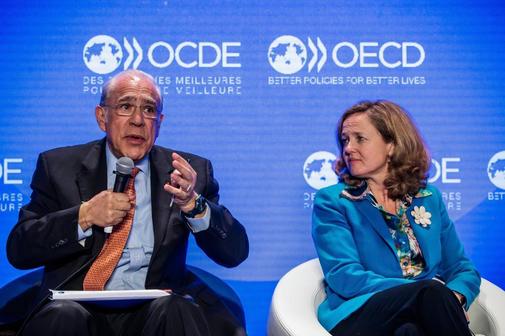The Organization for Economic Cooperation and Development (OECD) has revised downward the global growth outlook for 2019 and 2020, to its lowest level in a decade, due to economic and political uncertainty, as assured by the institution in the September update of its biannual report 'Economic Outlook'.
Specifically, the OECD has revised up to 2.9% growth in global gross domestic product (GDP) for 2019, three tenths less, while the adjustment for 2020 has been four tenths, up to 3%.
"The global outlook has become increasingly fragile and uncertain," said the Paris-based agency, adding that downside risks "continue to pile up."
Thus, the OECD has explained that the "intensification" of trade policy tensions is "increasingly affecting" confidence and investment, which in turn adds to political uncertainty, affects the feeling of risk of financial markets and "endangers" future growth prospects.
The reduction of the prognostics has been widespread. The institution now estimates that the euro zone will increase its joint GDP by 1.1% in 2019, one tenth less, while growth in 2020 will be 1%, four tenths less. The revision of the block of countries that use the euro as a common currency is due, above all, to Germany, whose economy will grow 0.5% in 2019, two tenths less than previously expected. France's growth for this year has remained at 1.3%, while in Italy, which will record stagnation, forecasts are also maintained.
By 2020, the OECD has reduced Germany's GDP growth to 0.6%, six tenths less. France, on its side, will grow by 1.2%, one tenth less, and Italy will register an advance of 0.4%, two tenths less.
The organization chaired by Ángel Gurría has warned that manufacturing activity is at its lowest level in seven years, while industrial activity is being particularly affected by commercial tensions. The activity of the services sector, on the other hand, has managed to continue, due to improvements in the labor market and the support of fiscal policies.
With respect to the rest of the large economies, the United States will end 2019 with an economic growth of 2.4%, four tenths less, while by 2020 the OECD has revised its forecast up to 2%, three tenths less than the previously estimated figure. The United Kingdom will grow 1% in 2019, two tenths less, and 0.9% in 2020, one tenth less. Japan , on the other hand, has undergone an upward revision of three tenths for this year, up to 1%, while by 2020 the estimate of 0.6% has not registered changes.
Among the major emerging countries and developing economies, China will grow 6.1% in 2019, one tenth less, and 5.7% in 2020, three tenths less. Turkey will see a contraction of three tenths this year, which represents an improvement of 2.3 percentage points compared to the previous estimate, although by 2020 it has remained unchanged at 1.6%.
The biggest revisions have been for Argentina , whose GDP will be reduced by 2.7% this year, nine tenths more, due to the new depreciation of the peso, high inflation and capital controls. By 2020, the adjustment has been 3.9 percentage points down, to a contraction of 1.8%.
MONETARY POLICY IS SOLD OUT
With respect to the long-term outlook, the OECD has warned that the economic and financial situation suggests that the "general moderation" of GDP and trade growth "may persist more than previously anticipated."
In this sense, low interest rates should be used to "cushion" the impact of the slowdown, although the impact of the change in the price of money will be "modest", especially in advanced economies.
The OECD agrees with the diagnosis of the European Central Bank (ECB), which has repeatedly reiterated that its measures would be amplified if they were supported by fiscal measures and structural reforms.
"Fiscal policy should help raise short-term growth by making use of exceptionally low interest rates, especially through spending measures such as increased infrastructure investment that raises short-term demand and benefits long-term growth. ", the developed country club has argued.
According to the criteria of The Trust Project
Know more- Italy
- France
- Paris
- United Kingdom
- Turkey
- Japan
- U.S
- China
- Argentina
- Germany
- Macroeconomy
- economy
- Crisis
Frenazo Countries prepare for the coming recession ... less Spain
EconomyThe tile suffers the first setback in the EU due to the German trade crisis
BasketballUnited States is no longer the favorite for the World Cup

